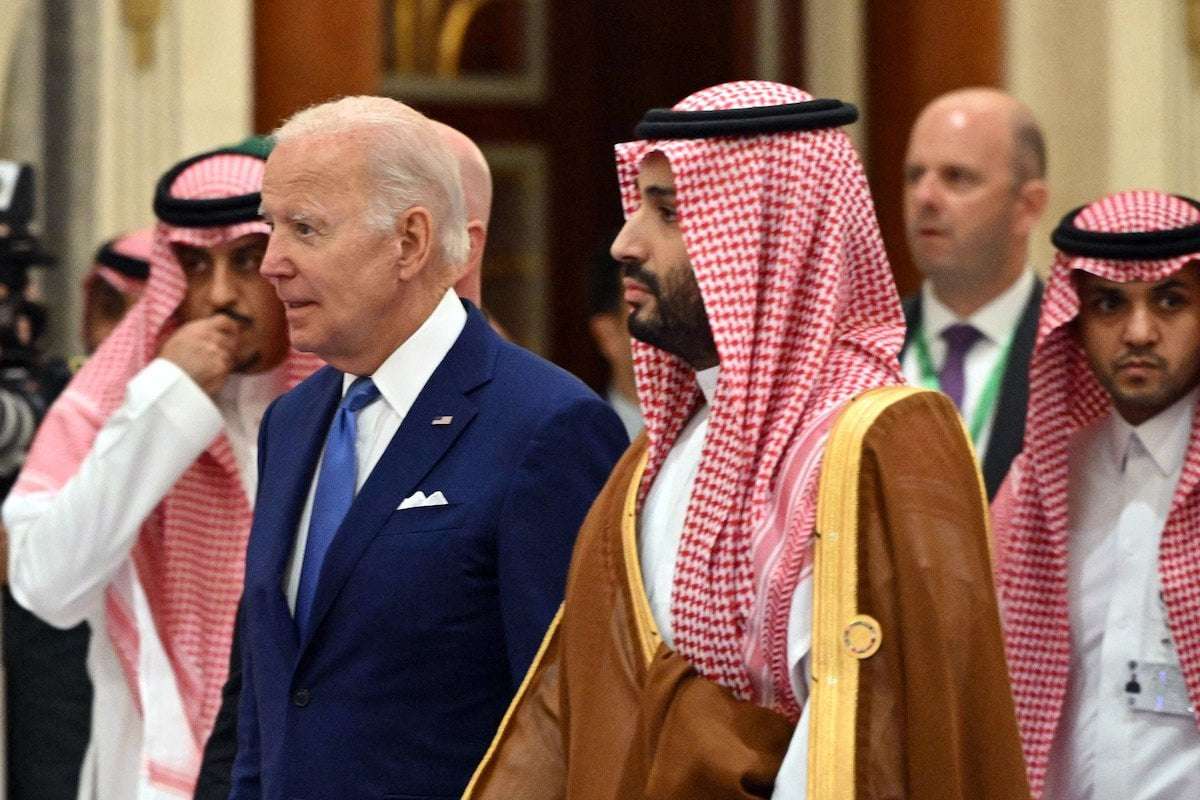Since President Joe Biden came into office in 2021, he has described a “battle between democracies and autocracies” in which the U.S. and other democracies strive to create a peaceful world. The reality, however, is that the Biden administration has helped increase the military power of a large number of authoritarian countries. According to an Intercept review of recently released government data, the U.S. sold weapons to at least 57 percent of the world’s autocratic countries in 2022. Since the end of the Cold War, the United States has been the world’s biggest weapons dealer, accounting for about 40 percent of all arms exports in a given year. In general, these exports are funded through grants or sales. There are two pathways for the latter category: foreign military sales and direct commercial sales.
The U.S. government acts as an intermediary for FMS acquisitions: It buys the materiel from a company first and then delivers the goods to the foreign recipient. DCS acquisitions are more straightforward: They’re the result of an agreement between a U.S. company and a foreign government. Both categories of sales require the government’s approval.
Country-level data for last year’s DCS authorizations was released in late April through the State Department’s Directorate of Defense Trade Controls. FMS figures for fiscal year 2022 were released earlier this year through the Pentagon’s Defense Security Cooperation Agency. According to their data, a total of 142 countries and territories bought weapons from the U.S. in 2022, for a total of $85 billion in bilateral sales. How many of those countries were democracies, and how many were autocracies? That question can be answered by comparing the new U.S. arms sales data to political regime data from the Varieties of Democracy project at the University of Gothenburg in Sweden, which uses a classification system that’s called Regimes of the World. The system classifies regimes into four categories: closed autocracy, electoral autocracy, electoral democracy, and liberal democracy. For a country to be classified as a democracy, it must have multiparty elections and political freedoms that make those elections meaningful. According to this methodology, the dividing line between democracies and autocracies is whether a country’s leaders are accountable to their citizens through free and fair elections. Of the 84 countries codified as autocracies under the Regimes of the World system in 2022, the United States sold weapons to at least 48, or 57 percent, of them. The “at least” qualifier is necessary because several factors frustrate the accurate tracking of U.S. weapons sales. The State Department’s report of commercial arms sales during the fiscal year makes prodigious use of “various” in its recipients category; as a result, the specific recipients for nearly $11 billion in weapons sales are not disclosed.
The Regimes of the World system is just one of the several indices that measure democracy worldwide, but running the same analysis with other popular indices produces similar results. For example, Freedom House listed 195 countries and for each one labeled whether it qualified as an electoral democracy in its annual The Regimes of the World system is just one of the several indices that measure democracy worldwide, but running the same analysis with other popular indices produces similar results. For example, Freedom House listed 195 countries and for each one labeled whether it qualified as an electoral democracy in its annual Freedom in the World report. Of the 85 countries Freedom House did not designate as an electoral democracy, the United States sold weapons to 49, or 58 percent, of them in fiscal year 2022. These findings contradict Biden’s preferred framing of international politics as fundamentally a struggle in which the world’s democracies, led by the United States, are on “the side of peace and security,” as he called it in last year’s State of the Union address. Opposing the United States and its democratic allies are the autocracies that collude to undermine the international system, Biden has stated. In a speech in Warsaw last year, he said the battle between democracy and autocracy is one “between liberty and repression” and “between a rules-based international order and one governed by brute force.” The White House’s 2022 National Security Strategy adds, “The most pressing strategic challenge facing our vision is from powers that layer authoritarian governance with a revisionist foreign policy.” Despite that rhetoric, a review of the new data suggests instead a business-as-usual approach to weapons sales. Former President Donald Trump based his arms sales policy primarily on economic considerations: corporate interests above all else. In his first foreign trip as president, he traveled to Saudi Arabia and announced a major arms deal with the repressive kingdom. Trump’s business-first approach resulted in a dramatic upturn in weapons sales during his administration.

anarchist_person1 on May 12nd, 2023 at 01:37 UTC »
The US has been since forever. That doesn't mean that the current administration shouldn't be criticized for it, although it is interesting that the government which espouses idealism around democratic values so heavily is adhering so closely to pragmatism, as opposed to cold war weapons trading which was largely done for idealistic reasons, as in propping up fascist or near-fascist regimes to oppose communism.
Due_Capital_3507 on May 11st, 2023 at 22:44 UTC »
Biden specifically or the United States as a whole? Very click bait headline.
thinkB4WeSpeak on May 11st, 2023 at 22:11 UTC »
Thr tradition of every party and president continuing the military industrial complexes errands continues.